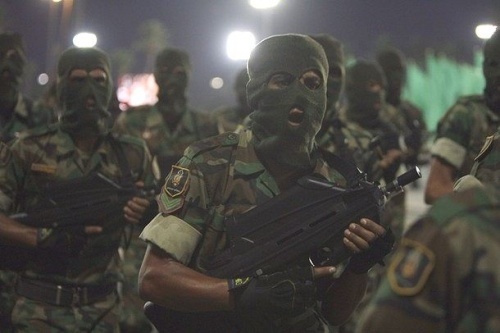
“Mercenaries pose a threat not only to security, but also to human rights and potentially to the right of peoples to self-determination,” according to Faiza Patel, who currently heads the Working Group on the use of mercenaries. “It is crucial that States cooperate to eliminate this phenomenon.” The use of mercenaries in armed conflict has been resurgent. Rise of private military and security companies raise numerous human rights challenges.
Employing Mercenaries in Civil Strife:
While traditionally mercenaries are viewed as soldiers hired to fight in an armed conflict or to overthrow a government, they have been used by governments in some recent conflicts against their own populations. In the Ivory Coast, for example, there is “considerable” evidence that the Government used some 4,500 Liberian mercenaries to avoid the results of a democratic election at the end of 2010, according to a news release issued by the five-member Working Group. (READ – “Ivory Coast Investigation to Proceed at ICC” -
diplomaticallyincorrect.org/films/blog_post/ivory-coast-investigation-to-proceed-at-icc-by-ambassador-mo/35740)
Libya-Mercenaries from Neighboring States to former Yugoslavia:
In Libya, foreign fighters’ were purportedly employed by the Gaddafi regime to repress peaceful demonstrations. Such mercenaries were allegedly recruited from African countries but also as far away as the former Yugoslavia (particularly Serbia). A Belgrade daily “Press” reported 12 Serbs executed by Libya’s then rebels in just one episode after they overran Gaddafi loyalist positions around the besieged town of Misrata. Other killed mercenaries, who fought on Gaddafi’s side, included 9 Croats, 11 Ukrainians and 10 Colombians among a total of 85. The report was also confirmed by Zagreb daily Vecernji List Libya correspondent on the ground. (PHOTO – purported Gaddafi mercenaries early in conflict).
Rise of Private Contractors/Security Companies:
The “ever-expanding” activities of private military and security companies continue to raise a number of challenges. According to Ms. Patel: “Providing security to its people is a fundamental responsibility of the State and outsourcing security to private military and security companies creates risks for human rights, hence the need to regulate their activities.”
Such private security contractors continue to undertake a growing range of activities in an increasing number of countries from drug-eradication programs in Colombia to post-conflict reconstruction. “And it is not just governments who take advantage of their services, but also NGOs [non-governmental organizations], private companies and the United Nations,” itself, according to Ms. Patel. (READ – “Against Pirates UN Approves Private Security “ -
diplomaticallyincorrect.org/films/blog_post/against-pirates-un-agency-approves-private-security-by-ambassador-mo/28163). For the Working Group, “the potential impact of the widespread activities of private military and security companies on human rights means that they cannot be allowed to continue to operate without adequate regulation and mechanisms to ensure accountability.”
“Blackwater” a Watershed in Iraq & Globally:
The panel, whose full title is the Working Group on the use of mercenaries as a means of violating human rights and impeding the exercise of the right of peoples to self-determination, noted in its report on Iraq that incidents involving private military and security companies there had dropped since the killing of 17 civilians and wounding of 20 others in Nissour Square in Baghdad by employees of the United States security company Blackwater in 2007. But it added that Iraq continues to grapple with the grant of legal immunity extended to private security contractors by US authorities after the 2003 invasion, preventing prosecutions in Iraqi courts while the case against the alleged perpetrators is still pending in US courts. (READ – “Private Security/Military in Iraq” -http://diplomaticallyincorrect.org/films/blog_post/private-security-military-in-iraq-un-expert-urges-controls-by-ambassador-mo/29472)
Follow up on Report to UN Human Rights Council:
Ms. Patel’s delivery of the Group’s Report to the UN General Assembly is a follow up on similar presentation to the UN Human Rights Council in Geneva in September of 2011. (ARTICLE/BLOG POST on September 15, 2011: “Private Security Contractors Threaten Rights” -
diplomaticallyincorrect.org/films/blog_post/private-security-contractors-threaten-rights-un-by-ambassador-mo/35152). That Report initially focused on South Africa, Equatorial Guinea as well as Iraq.
By Ambassador Muhamed Sacirbey
Facebook – Become a Fan at “Diplomatically Incorrect”
Twitter – Follow us at DiplomaticallyX
“War Crimes Justice” Channel -
diplomaticallyincorrect.org/c/war-crimes-justice

